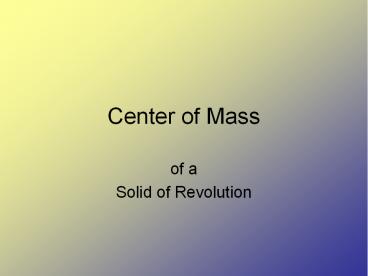Center of Mass - PowerPoint PPT Presentation
Title:
Center of Mass
Description:
Center of Mass of a Solid of Revolution * * * See-Saws We all remember the fun see-saw of our youth. But what happens if . . . Balancing Unequal Masses Moral Both the ... – PowerPoint PPT presentation
Number of Views:75
Avg rating:3.0/5.0
Title: Center of Mass
1
Center of Mass
- of a
- Solid of Revolution
2
See-Saws
We all remember the fun see-saw of our youth.
But what happens if . . .
3
Balancing Unequal Masses
Moral Both the masses and their positions affect
whether or not the see saw balances.
4
Balancing Unequal Masses
M1
M2
d1
d2
Need M1 d1 M2 d2
5
Changing our Point of View
6
In other words. . .
We can think of leaving the masses in place and
moving the fulcrum.
7
In other words. . .
M1
M2
d1
d2
(We still) need M1 d1 M2 d2
8
What happens if there are many things trying to
balance on the see-saw?
Where do we place the fulcrum?
Mathematical Setting First we fix an origin and a
coordinate system. . .
9
Mathematical Setting
And place the objects in the coordinate system. .
.
Except that now d1, d2, d3, d4, . . . denote the
placement of the objects in the coordinate
system, rather than relative to the fulcrum.
(Because we dont, as yet, know where the
fulcrum will be!)
10
Mathematical Setting
And place the objects in the coordinate system. .
.
M4
M1
M3
M2
d3
d4
0
d2
d1
We want to place the fulcrum at some coordinate
that will balance the system. is called
the center of mass of the system.
11
Mathematical Setting
And place the objects in the coordinate system. .
.
In order to balance 2 objects, we needed M1 d1
M2 d2 OR M1 d1 - M2 d2 0 For a system with n
objects we need
12
Finding the Center of Mass of the System
Now we solve for .
13
The Center of Mass of the System
In the expression
The numerator is called the first moment of the
system
The denominator is the total mass of the system
14
The Center of Mass of a Solid of Revolution.
- For the goblet project, you will need to
calculate the position of the center of mass of
your goblet (which is a solid of revolution!)
15
The Center of Mass of a Solid of Revolution.
- Some preliminary remarks
First, I will ask you to believe the following (I
think) plausible fact Due to the circular
symmetry of a solid of revolution, the center of
mass will have to lie on the central axis.
16
The Center of Mass of a Solid of Revolution.
- Some preliminary remarks
Next, in order to approximate the location of
this center of mass, we slice the solid into
thin slices, just as we did in approximating
volume.
17
The Center of Mass of a Solid of Revolution
We can treat this as a discrete, one-dimensional
center of mass problem!
18
Approximating the Center of Mass of a Solid of
Revolution
- What is the mass of each bead?
- Assume that the solid is made of a single
material so its density is a uniform ?
throughout. - Then the mass of a bead will simply be ? times
its volume.
19
Approximating the Center of Mass of a Solid of
Revolution
20
Approximating the Center of Mass of a Solid of
Revolution
f
21
Approximating the Center of Mass of a Solid of
Revolution
Summarizing The mass of the ith bead is The
position of the ith bead is
22
The Center of Mass of a Solid of Revolution
Both the numerator and denominator are Riemann
sums, and as we subdivide the solid more and more
finely, they approach integrals.
. . . And the fraction approaches the center of
mass of the solid!
23
The Center of Mass of a Solid of Revolution
In the limit as the number of slices goes to
infinity, we get the coordinate of the center of
mass of the solid . .
where a and b are the endpoints of the region
over which the solid is sliced.
24
If the cross sections are washers. . .
The derivation is more or less the same, except
that when we compute the area of the little
cylinder, we get as we did when we computed
the volume of a solid of revolution. So the
coordinate of the center of mass will be
where a and b are the endpoints of the region
over which the solid is sliced.































